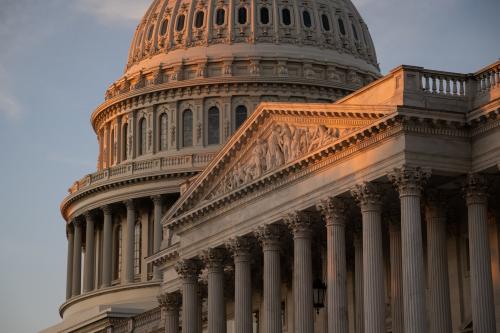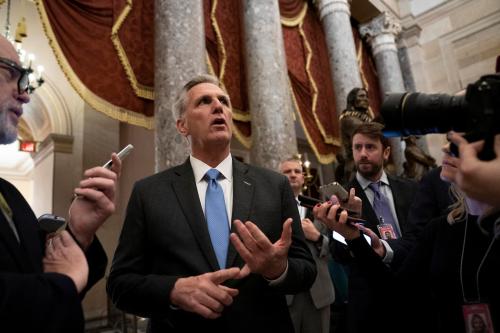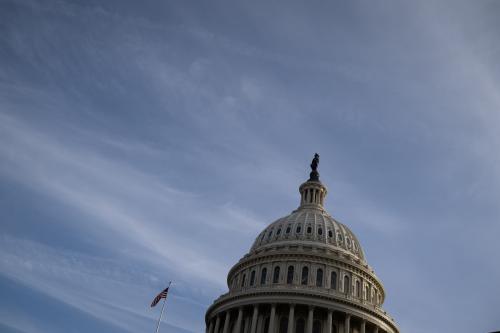Important parts of Kevin McCarthy’s deal-making last week involved government funding and the debt limit, suggesting that we are in for yet another round of high stakes fiscal brinkmanship, with the health of the economy at stake.
In both the formal rules adopted for the session and the additional commitments made by McCarthy to building a winning coalition are provisions that bear on fiscal politics. Some of these changes are the result of negotiations with holdouts in the Republican conference who initially opposed McCarthy while others reflect longer-held GOP positions.
Several provisions related to fiscal policy are better understood as expressions of Republicans’ core positions rather than binding constraints, especially in a period of divided government. Consider, for example, the restoration of the Cut-As-You-Go (CUTGO) rule. Last used by the Republican majority between 2011 and 2019, CUTGO prohibits the consideration of measures that would increase, on net, mandatory spending such as Medicare and Medicaid; it permits, however, the House to bring up bills that reduce revenue.
Under divided government, the chances of major new entitlement spending or major new tax cuts are low, and CUTGO, like other House rules, can be waived by a simple majority of the chamber. Often, a majority that has come to agreement on a measure is also willing to set aside any rules that stand as obstacles to passage. But codifying in the House rules a budget enforcement tool that, at least on paper, treats spending increases one way and tax cuts another reflects the GOP’s core position on the question.
In many ways, the agreements between McCarthy and the holdouts aren’t surprising. House Republicans have been telegraphing for some time that they would be willing to take the debt limit hostage as leverage for enacting large spending cuts, and if past is prologue, we need only to look to 2011, the last analogous arrangement of divided government (GOP House, Democratic majority in the Senate, and a Democratic president in the White House) to find the country’s last major debt limit crisis.
What the agreements do provide, however, is some additional detail around what House Republicans’ negotiating position might be. There is no publicly available, detailed document outlining the agreement, but a summary made available at a GOP conference meeting includes a commitment that the GOP “will not agree to Debt Limit increase without budget agreement or commensurate fiscal reforms.” The same summary calls for Republicans to “Adopt an FY24 Budget Resolution balancing within 10 years” and “Caps FY24 Discretionary Spending at Enacted FY22 levels or lower.”
To be clear, there’s a fair amount of uncertainty about how these positions relate to each other and how they’ll be operationalized; does the “budget agreement” necessary for agreeing to increase the debt limit have to be one that reverts to fiscal year 2022 spending levels? And while the fact that the Senate and White House are both controlled by Democrats who are very unlikely to agree to spending cuts of that size, knowing the details of the hostage House Republicans may try to take is illustrative. Reducing discretionary spending all the way to fiscal year 2022 levels would require major cuts—as large as 25% in real dollars for non-defense programs if defense spending is exempt.
What’s more, staking out a position that would roll back the increases passed in December’s omnibus bill—9.7% for defense spending and 5.5% for non-defense, non-veterans spending—means that Republicans’ opening ask is not merely continuing the status quo in the form of a continuing resolution that freezes spending at current levels. Suggesting that only a large reduction would be a “win” alters the negotiating terrain when it comes to avoiding a government shutdown.
Finally, other commitments—like the separate consideration of the 12 individual appropriations bills—should be thought of as rank-and-file members trying to assert their individual power in the legislative process. The use of omnibus spending bills has been driven, in part, by dynamics in the Senate; narrow majorities and the routine threats to filibuster individual appropriations bills mean that Senate leaders have resorted to combining all the measures into a single must-pass package. But the majority of the work on those individual bills is still done by the subcommittees of the Appropriations Committees in the two chambers, exercising power that some of their rank-and-file colleagues would like to wrest away.
How exactly the dynamics created by these rules changes and commitments from McCarthy play out remains to be seen. As Sarah Binder wrote on FixGov, we have previous examples of party leaders promising a more open process, only to crack down when the politics get tough. But so far it looks as if McCarthy has opened the door to some very tough economic choices.
The Brookings Institution is committed to quality, independence, and impact.
We are supported by a diverse array of funders. In line with our values and policies, each Brookings publication represents the sole views of its author(s).








Commentary
The McCarthy deal is guaranteed fiscal brinkmanship
January 12, 2023